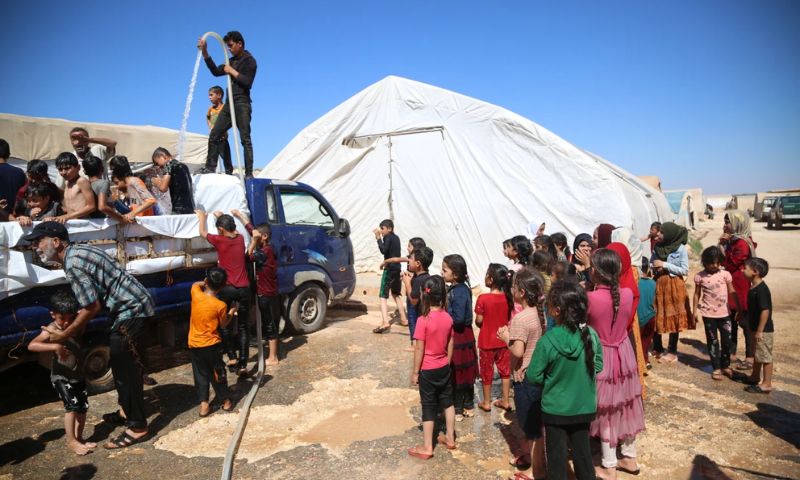A prevailing sense of fear has gripped the population in northwestern Syria, following reports of the suspension of critical food security projects supported by the United Nations. This suspension comes as a consequence of the failure to secure an extension for the entry of UN aid through the Bab aal-Hawa border crossing with Turkey. Moreover, the region is plagued by a lack of adequate camps with essential resources such as drinking water and bread, which constitute the primary sustenance for the local populace.
The northwestern regions of Syria are grappling with a deteriorating economic situation, inadequate infrastructure, and a heavy reliance on humanitarian assistance to sustain life. This reliance is particularly acute for families who have lost their primary breadwinners or have been affected by the devastating earthquake that struck the region last February.
Muath Bakbash, the director of the Sarmada office at the Ataa Humanitarian Relief Association, has highlighted that food security projects supported by the United Nations World Food Program (WFP) currently address only 40 to 50 percent of the region’s food security requirements, with local donations covering a mere 1 percent.
Bakbash has issued a stark warning, emphasizing that any obstruction in extending the entry of humanitarian aid through the Bab al-Hawa crossing poses a grave threat to these vital projects. This potential disruption foreshadows a looming “humanitarian catastrophe” that could befall northern Syria. He points out the inability of humanitarian organizations to meet the basic needs of the people, which could have dire consequences for their health and overall well-being.
Among the most critical food security projects implemented by humanitarian organizations in the northern Syrian camps are those related to the distribution of bread and the supply of drinking water. This is especially crucial given the damage to infrastructure such as roads, water supply networks, and sewage systems, which has made it increasingly challenging to provide water to the camps.
According to Bakbash, bread and water represent the fundamental necessities for the camp residents. While he acknowledges that the current projects may be somewhat limited in scope, there are ongoing efforts to establish drinking water stations in the camps, recognizing the increased demand for water, especially during the hot summer months.
Furthermore, Bakbash underscores that the population is grappling with a staggering increase in prices, exceeding 24% compared to the previous year. This has rendered it impossible for families in the camps to afford water, which is being sold at exorbitant prices within the camp boundaries.
In light of these dire circumstances, Bakbash appeals for urgent action from the international community. He calls for concerted efforts to secure an extension of the decision to allow aid entry and implores all humanitarian organizations, media outlets, and human rights institutions to unite their efforts in averting the impending “catastrophe.”
Fears of worsening crisis
The suspension of food security projects not only threatens the economic well-being of the population but also carries the potential for serious health and social problems that will burden the affected communities.
Abdul Salam al-Yousef, the director of al-Tah camp situated in the northern countryside of Idleb, has disclosed that the camp is home to 307 families, all of whom fall below the poverty line. Among these families, 50 have no breadwinners, 15 have at least one member with special needs, and 30 have been impacted by the recent earthquake.
Tah camp faces a scarcity of food security projects initiated by humanitarian organizations, despite their already limited scope. These projects play a vital role in sustaining the lives of residents and providing the essential water needed for drinking and cleaning, as per Yousef.
According to the camp’s director, a pervasive sense of “panic and fear” has enveloped the residents following reports of the cessation of bread and water aid. There are growing concerns about the potential outbreak of diseases, particularly skin ailments due to water scarcity, and childhood illnesses resulting from inadequate nutrition. Yousef emphasizes that the suspension of humanitarian aid will have detrimental effects on all aspects of life within the camp.
Furthermore, the risk of increased school dropout rates among children and the prevalence of child labour in the community are expected to rise due to the anticipated poverty and destitution resulting from the aid suspension.
On a social level, the surge in poverty and the perceived inability of parents to provide for their children’s basic needs may lead to an upswing in suicides, divorces, and the disintegration of families within the camp.
This article was translated and edited by The Syrian Observer. The Syrian Observer has not verified the content of this story. Responsibility for the information and views set out in this article lies entirely with the author.


